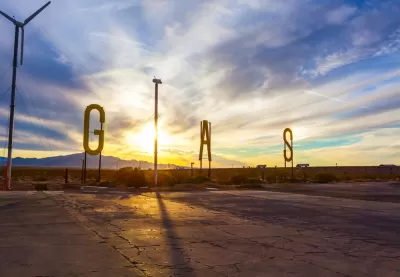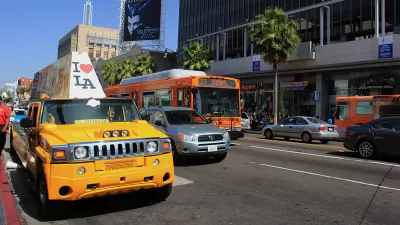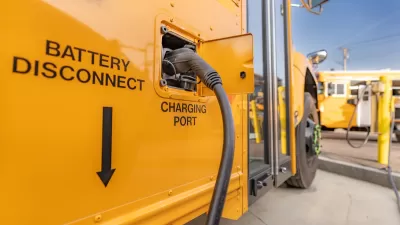With the state mandating a switch to electric vehicles by 2035, Petaluma is aligning its land use regulations with its climate goals.

The city of Petaluma, located in the North Bay Area in California, is the first city in the United States to ban the construction of new gas stations.
Kathryn Palmer reports that the city approved the decision in February, cementing a two-year moratorium on new gas stations. A unanimous vote by the Petaluma City Council on Monday, March 1 took the final step toward adoption. The decision is intended to contribute to the city's goals to achieve zero emissions by 2030, and piggybacks on a push at the state level to end the sale of gas-powered automobiles.
"It also streamlines processes for existing gas stations seeking to add electric vehicle charging stations and potential hydrogen fuel cell stations, with city staff underlining an urgency to support alternative fueling in order to meet state zero-emission infrastructure targets," reports Palmer.
The city of 60,000 people currently has 16 operational gas stations, with a gas station within a five-minute drive of every planned or existing residence in the city, according to the article. According to the article, a recent controversy over a planned gas station at a Safeway supermarket location contributed, but was not the sole reason, to the decision.
The city's status as the first city in the country to ban the development of new gas stations has been picked up by the regional and national media sources. Andrew Chamings reports on the story for SFGate, headlining the "first in the U.S." detail. Tim Levin frames the story as a step toward an all-electric future in a story for Business Insider. Steve Schrader picks up the story for The Drive, also headlining the "first" angle. And Jennifer A Kingston picked up the news for Axios, implying that Petaluma is the first of what will eventually be many cities to take similar action.
FULL STORY: Petaluma City Council moves to ban new gas stations

Study: Maui’s Plan to Convert Vacation Rentals to Long-Term Housing Could Cause Nearly $1 Billion Economic Loss
The plan would reduce visitor accommodation by 25,% resulting in 1,900 jobs lost.

North Texas Transit Leaders Tout Benefits of TOD for Growing Region
At a summit focused on transit-oriented development, policymakers discussed how North Texas’ expanded light rail system can serve as a tool for economic growth.

Why Should We Subsidize Public Transportation?
Many public transit agencies face financial stress due to rising costs, declining fare revenue, and declining subsidies. Transit advocates must provide a strong business case for increasing public transit funding.

How to Make US Trains Faster
Changes to boarding platforms and a switch to electric trains could improve U.S. passenger rail service without the added cost of high-speed rail.

Columbia’s Revitalized ‘Loop’ Is a Hub for Local Entrepreneurs
A focus on small businesses is helping a commercial corridor in Columbia, Missouri thrive.

Invasive Insect Threatens Minnesota’s Ash Forests
The Emerald Ash Borer is a rapidly spreading invasive pest threatening Minnesota’s ash trees, and homeowners are encouraged to plant diverse replacement species, avoid moving ash firewood, and monitor for signs of infestation.
Urban Design for Planners 1: Software Tools
This six-course series explores essential urban design concepts using open source software and equips planners with the tools they need to participate fully in the urban design process.
Planning for Universal Design
Learn the tools for implementing Universal Design in planning regulations.
Ascent Environmental
Borough of Carlisle
Institute for Housing and Urban Development Studies (IHS)
City of Grandview
Harvard GSD Executive Education
Toledo-Lucas County Plan Commissions
Salt Lake City
NYU Wagner Graduate School of Public Service





























